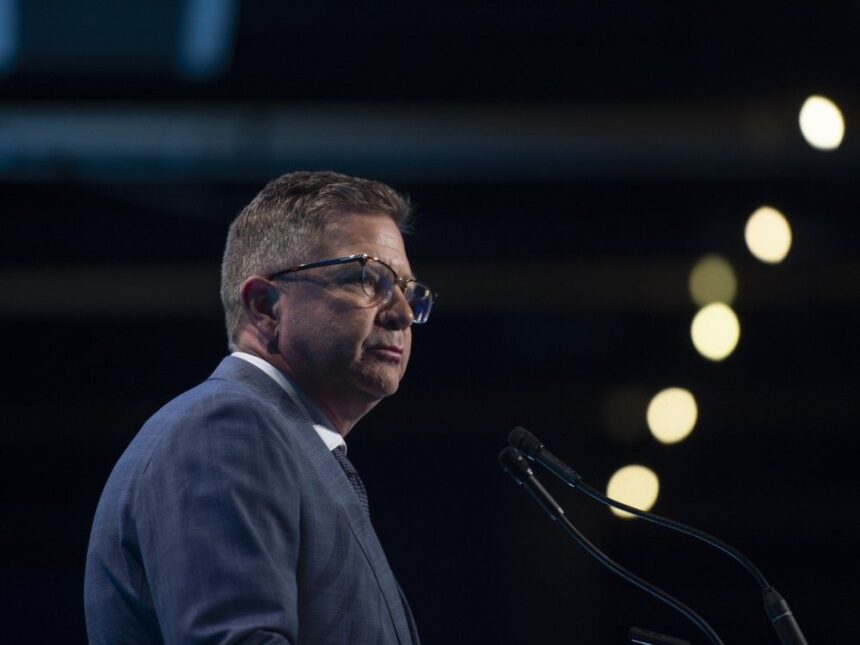The southwestern corner of Edmonton’s City Hall plaza buzzed with anticipation yesterday morning as Ward pihêsiwin Councillor Tim Cartmell officially launched his bid for the mayor’s chair. With the October 2025 municipal election still more than a year away, Cartmell’s early announcement signals what many political watchers believe will be a highly competitive race.
Standing before a crowd of about 75 supporters, Cartmell didn’t mince words about his motivation. “There are things that are broken in our city government, and I want to fix them,” he declared, his voice carrying across the plaza as downtown workers paused on their morning commutes.
The three-term councillor, known for his engineering background and detail-oriented approach to city issues, outlined what he calls his “pragmatic vision” for Edmonton’s future. His speech focused heavily on three key areas: public safety concerns, transportation challenges, and what he described as a “dysfunctional organizational culture” at City Hall.
“I’ve spent six years watching how decisions get made from the inside,” Cartmell told me after his announcement. “The frustrating part is seeing good ideas get buried under process and politics. Edmontonians deserve better than that.”
Cartmell’s candidacy comes at a time when many residents express growing dissatisfaction with city services. According to the latest Edmonton Citizen Satisfaction Survey released in April, overall satisfaction with city programs has dropped 12 percentage points since 2021.
“What I’m hearing in pihêsiwin and across the city is that people feel disconnected from their local government,” Cartmell explained. “They see resources being allocated to projects they don’t prioritize while their neighborhoods deal with crime, poor road maintenance, and inconsistent transit service.”
Political analyst Chaldeans Mensah from MacEwan University says Cartmell’s positioning as a “fixer” could resonate with voters. “He’s establishing himself as the experienced insider who nonetheless sees the flaws in the system,” Mensah noted. “It’s a compelling narrative, particularly when public confidence in institutions is at a low point.”
Cartmell’s announcement has already drawn reactions from across Edmonton’s political spectrum. The Edmonton Chamber of Commerce welcomed his entry into the race, with President and CEO Jeffrey Sundquist noting that “healthy democratic competition and substantive policy discussions benefit our entire community.”
Meanwhile, community activist Haruun Ali, who has been vocal about the need for younger, more diverse representation in city politics, expressed concern about Cartmell’s approach. “We need transformative leadership, not just fixing what’s broken,” Ali said. “Edmonton faces climate challenges, housing affordability issues, and deep inequities that require bold new thinking.”
Current Mayor Amarjeet Sohi, who has not yet declared whether he’ll seek a second term, offered a measured response to Cartmell’s announcement. “Councillor Cartmell has been a dedicated public servant, and I welcome all voices in the democratic process,” Sohi stated through his communications director. “My focus remains on governing and delivering results for Edmontonians.”
Walking through Churchill Square after the announcement, I couldn’t help noticing the mixed reactions from morning commuters who had stopped to listen. Some nodded approvingly at Cartmell’s promises to improve snow clearing and address transit reliability. Others seemed skeptical of yet another politician promising change.
“I’ve lived here 30 years, and I’ve heard it all before,” said Margaret Wilson, a retired teacher I spoke with near the Stanley A. Milner Library. “What I want to know is specifically what he’ll do differently. The problems are obvious – it’s the solutions that matter.”
Cartmell appears aware of this challenge. His campaign has launched a website detailing his plans for what he calls “practical improvements” to city services, including a commitment to review the police funding formula and consider modifications to the controversial bike lane network.
When asked about how he differs from current city leadership, Cartmell emphasized his collaborative







